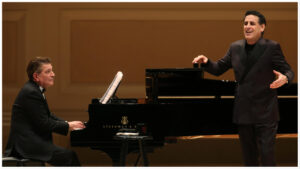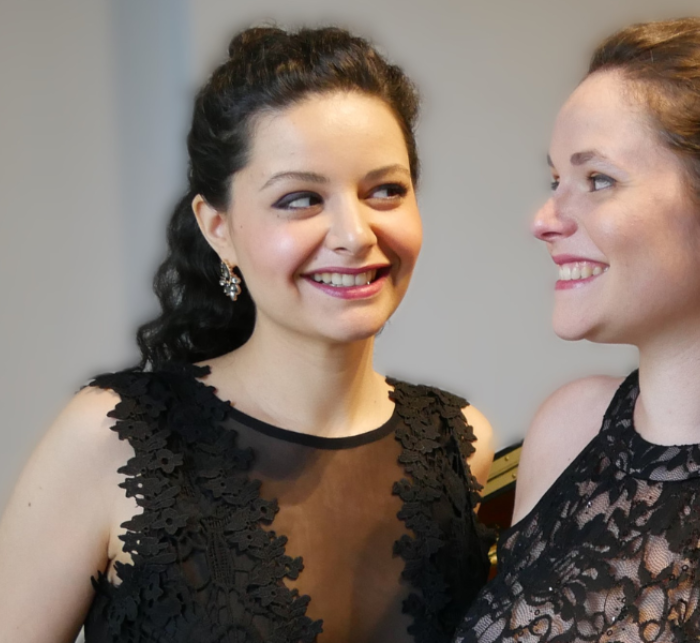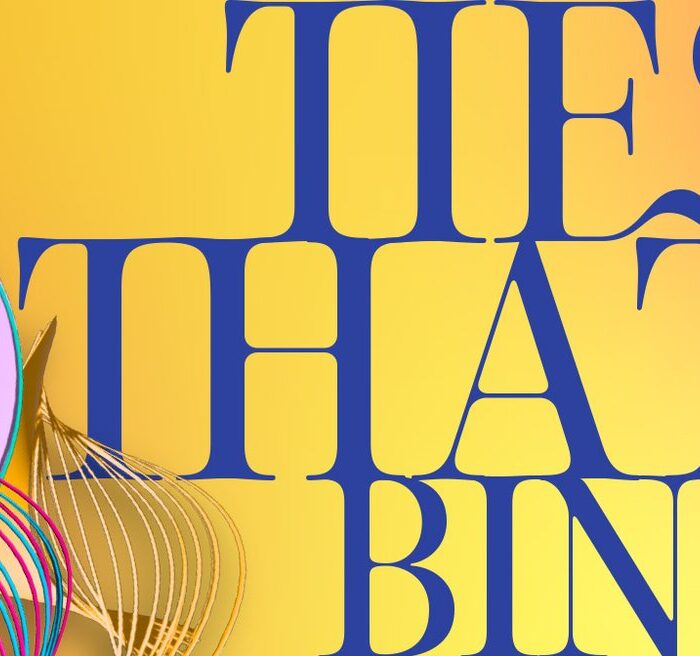
Carnegie Hall 2023-24 Review: Juan Diego Florez & Vincenzo Scalera
By Logan MartellOn November 29, 2023, famed tenor Juan Diego Flórez returned to Carnegie Hall for a concert of arias and arts songs, joined by pianist Vincenzo Scalera. Initially scheduled for January, the concert was postponed due to illness with the November performance nearly suffering the same fate as Flórez acknowledged that he was currently under the weather. Despite this, Flórez and Scalera delivered a poignant program of works which resonated with the audience.
Opening the concert was “O del mio dolce ardor,” Gluck’s “Paride ed Elena.” Riding the canter of the accompaniment, this number saw Flórez employ soft, sustained phrases to convey the narrator’s infatuation as their effect on him colored the lines with a flexible dynamic. Following in this gentle but passionate mood were the next two numbers, “Amarilli, mia bella” by Giulio Romolo Caccini, where the somber chords and trills of the accompaniment finely set the backdrop for Flórez’s pleading ornaments; and Giacomo Carissimi’s “Vittoria, mio core!” where the sense of newfound freedom from a love gone wrong set a growing vocal fire which brought him to greater heights.
Next on the program was “L’esule,” from Rossini’s collection of pieces called “Peches de vieillesse,” or “Sins of Old Age.” The circling impression of the accompaniment did much to bring out the beauty but ultimate dissatisfaction with the sights experienced by the narrator exiled from his homeland, with Flórez channeling a disconsolate beauty in his delivery which swelled as his thoughts shifted from what was before him to what was behind him. Also from this Rossini work was the following number “La lontananza,” which saw Flórez display more of the qualities found in a classic love aria, as he tied imagery of nature’s beauty to the narrator’s love for his Elivira.
After this came the first of three instrumental numbers from Scalera, Rossini’s “Danse Siberienne,” which unfolded with great expression through the running chords and descending trills and melodic figures, evoking a more Eastern musical atmosphere in short order for this brief number.
Flórez soon returned to the stage for the following number, “Deh! Tu m’assisti amore” from Giuseppe Maria Foppa’s “Il signor Bruschino.” By this time in the concert, it felt like Flórez had warmed up and sung enough to get a solid sense of where his voice was currently in its recovery to push the boundaries a little more. This number saw the light, falling melody joined by Flórez’s ornament-laden delivery of the text only two lines long: “Assist me, oh love, now that I come back to you. Give to my passions that favors for which they sigh.” His sense of phrasing brought the most of this text, and his rising cadenza came with a splendid ease to close it out. Continuing in this vein was “La speranza” from Rossini’s “Semiramide,” where the opening stanza was treated with shifting nuance through its repetitions before a running transition into the cabaletta, with Flórez displaying soaring high notes which brought the first half of the program to a powerful end.
Starting off the second half was “Linda Si ritiro… Se tanto in ira agli uomini,” from Donizetti’s “Linda di Chamounix.” This selection showed off Flórez’s dramatic sense in the initial sections, as he seemed to live within Carlo’s aching circumstances, while the fervor built towards a powerful spinto conclusion. The next number, “Inosservato penetrava… Angelo casto e bel” from Matteo Salvi’s “Il duca d’Alba,” saw Scalera deliver the introduction with Flórez entering from backstage as he delivered the text with affection as well as hushed, suspicious tones which gave way to a firmer passion as he navigated these passages to great effect.
Next on the program was the second instrumental piece, “Romanza senza parole,” by Giuseppe Verdi for the 1865 piano collection “Gioie e sospiri.” This work saw Scalera illuminate the andantino with remarkable beauty as the melody danced within the higher registers and above the running, nostalgic figures laid out by the left hand. Continuing the Verdi, Flórez returned to the stage for “Questa o quella” from “Rigoletto,” where the duke’s flighty nature was related with confidence as well as charm through the deft vocal leaps. A stunning showcase followed not long after for “L’emir aupres de lui appellee… Je veux encore entendre” from “Jerusalem,” which swelled from despondency over Gaston’s exile and separation from his Helene, to thoughts of their reunion heard through passionate, melismatic phrases capped out by breathtaking high notes and met with great applause.
In a similarly-romantic mood came the following selection, “L’amour, l’amour!… Ah! Leve-toi, soleil,” from Gounod’s “Romeo et Juliette.” His rich phrasing of the French text rose in passion as he called upon the rising sun with warm, bracing tones that unfolded to wonderful heights. Last of the instrumental pieces was “Foglio d’album,” where the softer measures were nicely accentuated by accidental passing tones, creating a gentle restlessness which livened the triple meter passages.
Bringing the program to an end was “Ecco la casa… Torna ai felici di” from “Le Villi.” Flórez joined the heightened accompaniment with great energy to channel the desperation of Roberto as he’s plagued by Anna’s death and his fear of her father’s curse. These elements heard great expression through Flórez’s haunted bearing and vocal delivery, with the accompaniment seeming to mirror his phrases, echoing the sentiments as the two built to a massive, ruinous conclusion.
Not content to end things on such a dire note, a number of encores followed after the initial applause, with Flórez and Scalera performing Salvatore Cardillo’s “Core n’grato” and Ernesto de Curtis’ “Tu ca nun chicagne” together. After this, Flórez returned to the stage once more for a set of five songs, accompanying himself on guitar for selections such as Chabuca Granda’s “Jose Antonio” and “La flor de la canela,” Carlos Gardel’s “El dia que me quieras,” and more.
In all, there was much for the audience to enjoy from Wednesday’s concert. Despite the risk of rescheduling once again, Flórez’s performance and the audience’s reception prove that even when plans go awry, the beauty of art can still triumph.



